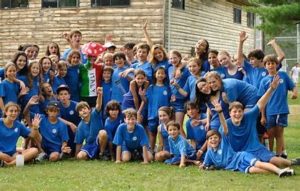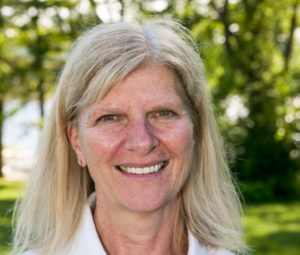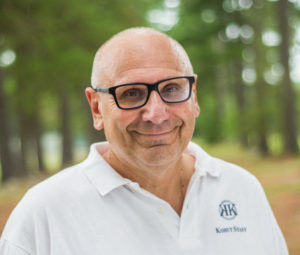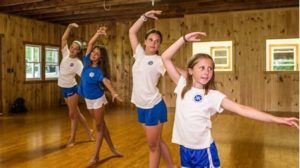Kamp Kohut: Fostering Opportunities for Kids to “Glow”
Lisa Tripler owns and directs Oxford’s Kamp Kohut with her husband, attorney Dan Rapaport. And back in the early 90s, when the couple contemplated purchasing the camp property, Tripler says she “managed to convince my husband that this would be the dream of a lifetime.” His response, she says, was to fully support her – and concede that at the very worst the purchase would be a sound real estate investment.

But the dream has been coming true for a quarter century. Nearly twenty-six years after that purchase, Kamp Kohut continues to thrive as a unique co-ed camp, what Tripler calls a “brother-sister model.”
“I want them to leave glowing,” she says, “just feeling really proud of themselves for learning new things.”
Kamp Kohut wasn’t new to Tripler when she and Rapaport attended the lake association meeting on the campus to led to the 1992 purchase. It was, in fact, something of a homecoming to the place – a boys’ camp founded in 1907 – where her teacher parents worked summers and she ran around “being one of the guys.”
“As a little girl growing up at Kohut, I loved the boys’ pure enthusiasm for what they did,” she says. And as Tripler grew older and became a camper and then counselor at Camp Fernwood, she continued to appreciate the “joy and spirit” of camp life.

As for long-term career goals, Tripler says her parents opposed her desire to become a teacher. Instead, she went to law school, with a plan to serve children’s needs in the legal system. The plan was a “fiasco,” she says, “because in Maine, juvenile law is criminal law, not family law.”
Tripler says she took time off to be with her young daughters, but still had camp connections, a camp mindset. Then came the family’s purchase of a home on Lake Thompson, that association meeting at Kohut, and the beginning of a new career and new way of life.
Kohut was a boys’ camp; Tripler and Rapaport changed that in their inaugural season. The boys’ and girls’ cabins are separated by an expanse of green space.

“We tried to take the best of girls and the best of boys,” Tripler says. “Boys really can have a good time and take showers. Girls can play soccer on the soccer field.
“As I retell the story 26 years later, society has evolved in a wonderful way. There’s not such a clear dramatic difference.”
Boys and girls at Kamp Kohut have a vast array of activities to choose from, and for two four-week sessions each summer the camp welcomes about 100 girls and 100 boys – along with more than 100 staff members to teach and mentor and guide them. Boys and girls participate separately in their activities but have equal exposure to the choices offered them. \
“I wanted to raise the level of expectation for both genders – for the skill level of what they’re doing,” Tripler says. ‘If boys want to do dance, go for it and teach them really good dance steps.” But if street hockey is the passion, that works, too; the same coach works with both boys and girls.

Kamp Kohut campers can spend their days doing everything from rowing a shell in the crew activity to taking music lessons. Sewing and ceramics, windsurfing and videography, roller hockey and woodworking. Kamp Kohut even teaches fencing. Campers can opt for literally dozens of adventures in learning and fun.
“The way our schedule works, the idea is that there’s something there for everybody,” Tripler says. “I want them to find the passion and help them go as far as they can.”
In striving to serve kids, stereotypes are cast aside, Tripler says. “Everybody has a chance to be equal.” Campers “have a lot of different opportunities to feel confident,” she says.

All the while, Tripler says it is important to focus on the small details. Each camper arrives at his or her cabin to find a welcoming sign above their beds. In the dining hall they sit at tables of six – four campers and two staff – to promote meaningful conversations. Young campers are assigned a big brother or big sister to increase that feeling of belonging. There’s a family aspect to the camp’s operations, too. For the past several years, Carly, the younger of the Rapaport/Tripler family’s two daughters, has been a full-time staff member. Older daughter Julie is a senior studio executive at Amazon films and lives in Los Angeles.
“Part of my whole mission is to attract really nice kids, and make sure nobody gets lost in the shuffle,” Tripler says. “We really work on respecting each other, and respecting differences.”
Various all-camp activities bring boys and girls together, including a weekly campfire, outdoor music and dance fests, or simple down time after supper. And Tripler says because many brothers and sisters attend camp, they get periodical chances to check in with each other.
“One of the wonderful things about the camping industry is that we’re professionals. We take this seriously,” Tripler says. “We always try to up our game and provide what we think kids need.”
“It’s all about the self-confidence that comes from being away from home, and managing independently,” she says.
In a world of increasing turmoil, Tripler says camp is a difference-maker. “There really is a kind caring community out there,” she says. “At the end of the day, it’s a real human connection that’s going to save us.”